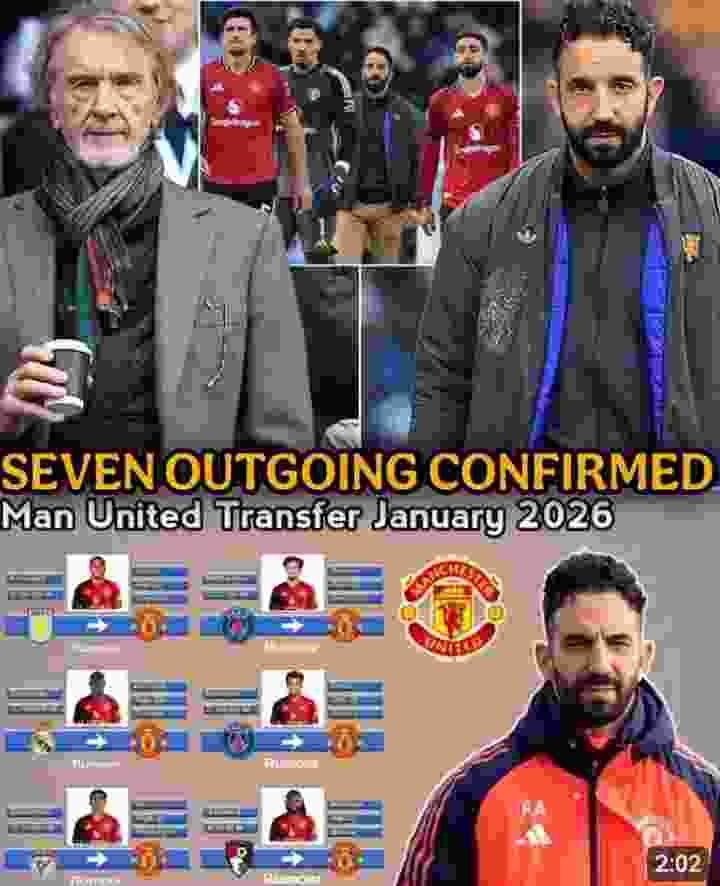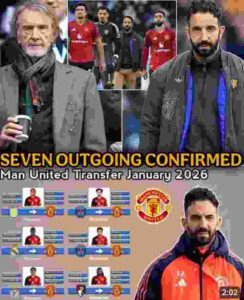“Man United Owner Sir Jim Ratcliffe Green-Lights the Sale of Seven First-Team Players Following Rubén Amorim’s Request — Replacements Already Identified”
—
The Manchester United overhaul is gathering pace. Owner Sir Jim Ratcliffe has reportedly given his backing to Rubén Amorim’s plan to offload seven first-team players by the January transfer window — and the club appears to have already lined up their replacements.
Why the shake-up?
Manchester United find themselves in a difficult phase: off the pace in the Premier League, burdened by high wages and large transfer-fees from recent years, and facing financial sustainability pressures. Ratcliffe has been brutally honest about the state of the club’s squad, describing some players as “not good enough” or “probably over-paid” under the previous regime.
Amorim, who took over coaching duties mid-season, has also made clear that changes are necessary. He has admitted that the squad needs trimming if United are to rebuild.
The scope: Seven out, new players in
Although the exact names of the outgoing seven have not been definitively confirmed in full detail, reports suggest that a broad clear-out is underway. These would involve players who either don’t fit Amorim’s system, carry high wages, or whose performances have fallen below expectations.
Simultaneously, replacements have reportedly been earmarked. The idea is that United will not only remove liabilities but also bring in players suited to a fresh tactical setup — one favoured by Amorim — and better aligned with long-term planning.
The rationale behind the replacements
1. Tactical fit: Amorim is known for a more modern, dynamic style. The players he inherited were often signed in other regimes and may not align with his preferred shape and work-ethic.
2. Financial sustainability: United’s wage bill and transfer amortisation are viewed as unsustainable. Off-loading seven players will free up significant funds — both in transfer fees and annual salaries — thereby enabling more targeted investment. Ratcliffe himself has said that the club will run out of cash by the end of the year if corrective measures are not taken.
3. Renewal and culture change: Beyond just the names, the overhaul signals a change in mindset — a willingness to move on from under-performers or ill-fitting stars, and build a squad that is hungry, attuned to United’s values, and suited to Amorim’s coaching.
Potential risks and challenges
Disruption: Letting seven first-team players go will inevitably create a period of instability. The replacements must hit the ground running or United risk falling further behind in the competitive Premier League.
Fan reaction: United’s supporters have high expectations. A mass sale could be unpopular unless it is clearly linked to improved performance on the pitch and credible incoming players.
Timing: The January window is always tricky — fewer quality targets available, inflated prices, and less time for new players to adapt before crucial fixtures.
Balance between short-term and long-term: While the clear-out may be necessary for long-term health, United still need to win games and build momentum to avoid the cycle of underachievement continuing.
What this means for United’s immediate future
United will likely emerge from January with a materially changed squad. Some well-known faces may depart — signaling the end of an era for certain high-wage/low-return players.
Incoming replacements will likely be younger, more dynamic, and more suited to Amorim’s preferred style of play. This suggests United are refocusing on building a team rather than buying quick fixes.
Financially, the club is positioning itself for a reset: fewer bloated contracts, more flexibility in the transfer market, and a clearer alignment between strategy and cost.
On the pitch, the hope will be that the clear-out and replacements lead to quicker adaptation to Amorim’s tactics, improved performances, and a turnaround in form. A successful January window could be the springboard into a more competitive second half of the season.
The broader message
This is more than just a summer-plus window of turnover: it’s a statement. United under Ratcliffe and Amorim are saying: “We’re serious about change. We’re getting rid of what doesn’t work, we’re bringing in what does, and we’re going to rebuild sustainably.” The fact that the replacements are already named suggests the club has done its homework and isn’t merely off-loading for the sake of balancing books — they are planning a clear reinvestment.
Conclusion
In short: Manchester United are embarking on a bold reset. Sir Jim Ratcliffe has approved Rubén Amorim’s blueprint to sell seven first-team players by January — and to bring in new blood aligned to his vision. The road ahead won’t be easy, and the risk of instability is real. But if executed well, this overhaul could mark the beginning of a new chapter for United: one defined by sharper recruitment, cleaner finances, clearer identity and better alignment between the boardroom, coaching staff and playing squad.












Leave a Reply